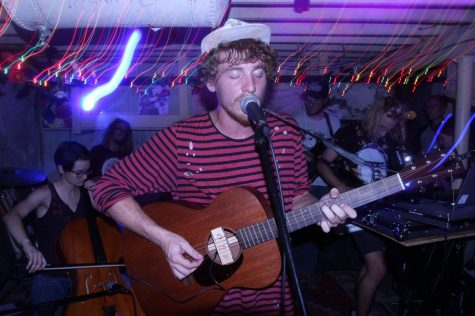Oakland house shows offer intimate experience
Dylan Kersten talks about community-based scene
April 16, 2019

String Machine performing at the Bushnel.
Pittsburgh has a number of affordable venues available to college students, like Mr. Smalls, Rex Theater and Stage AE, just to name a few. But for those that want a more intimate and gritty experience complete with sweat and tears — house shows are the way to go.
A house show typically consists of a bare bones set up in the basement or living room of someone’s house. The DIY branded scene has been around as early Mozart’s time, but gained significant traction when it helped launch genres of hip hop and punk in the ‘70s and ‘80s.
Dylan Kersten, a senior global cultural studies major, has his own band, String Machine, that have been heavily involved in the house show scene in Oakland. He appreciates both attending and performing at house shows due to an unbridled sense of intimacy.
“Being on the same level as the people is really significant, there’s no feeling of ‘I’m in the band I’m on the stage’ cause there’s no stage,” Kersten said.
Kersten joined the Butler-based String Machine in 2016, taking over the synthesizer for the experimental folk outfit. They were connected to the DIY scene in Oakland through a show at Black Forge Coffee House and started playing house shows there in 2017.
The process for going to a house show happens in a more roundabout way than simply ordering a ticket online from Ticketmaster. In order to avoid issues of permits, events are mainly posted on Facebook under the name of the venue and require an invite from either the owner or one of the bands to attend. This creates a niche community built on a name-to-name basis and keeps heavy ticket fees at bay in exchange for a cheap cover charge.
Playing in someone’s basement is also different than performing at a designated venue given the pressure of built in sound expectations.
“Whenever we’ve played Smiling Moose or Funhouse at Mr. Smalls, whenever you can actually hear yourselves it’s a little more nerve wracking, cause you’ll hear if you mess up,” Kersten said. “House shows are like, ‘this is the stuff we’ve been practicing for a while and now you guys get to hear it with us.’”
According to Kersten, the scene is a great way to make new people and is designed with that built-in aspect of being half about the social side and half about the music.
“I love to meet new people, the house scene is very conscious of the environment and want to make sure it’s cool,” Kersten said. “You make friends with bands who are touring.”
For those cautious of the idea of going to a stranger’s house for a show, Kersten recommends checking out Mr. Roboto Project in Pittsburgh first. The venue has a smaller DIY feel and gives audience members an idea of the kind of music they’re in for.
A lot of the house shows are cross genre, featuring everything from emo, to hip-hop, to metal. People should not only be open to exploring new genres, but also to acclimating themselves to the environment. The sound isn’t going to be as crisp or clean compared to a concert at Stage AE because these venues weren’t built for that.
What Kersten likes most about the house show scene is the fact that everyone has access to the music and to each other, as well.
“The fact that the barrier between artist and like concert goer is almost entirely broken down, I have no sense of superiority as a musician and I’m not intimidated to talk to other band members if I go to a show as an audience member,” Kersten said. “There’s no hierarchy, everyone’s part of it.”

















